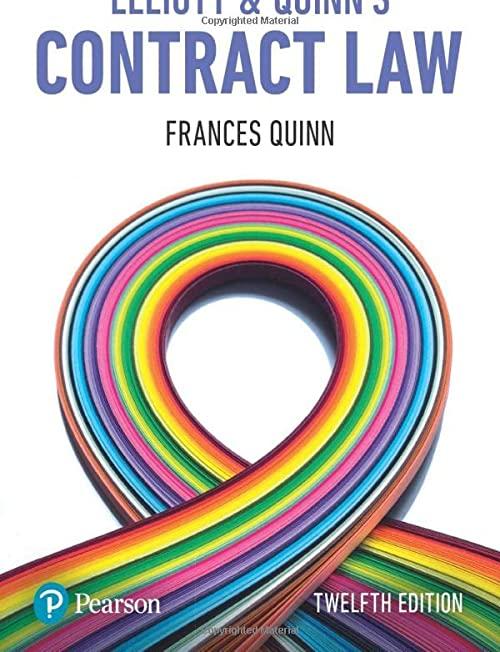Question
Part Two: Provide a brief description of the tort issue involved, the claim being made by the plaintiff, the defense being offered by the defendant
Part Two: Provide a brief description of the tort issue involved, the claim being made by the plaintiff, the defense being offered by the defendant and any outcome of any pending legal proceeding thus far.
Read the Article below
Supreme Court Rules Cargill, Nestle Can't Be Sued in Child-Labor Case
Justices say allegations of abuse in Ivory Coast don't have enough connection to the U.S.
Nestl and Cargill say they oppose exploitation of children and didn't own the farms where abuses allegedly occurred.
PHOTO:FABRICE COFFRINI/AGENCE FRANCE-PRESSE/GETTY IMAGES
ByJess BravinandBrent Kendall
Updated June 17, 2021 5:40 pm ET
WASHINGTONThe Supreme Court ruled Thursday that Nestl USA and Cargill Inc.can't be sued in U.S. courtsfor abuses allegedly committed in Ivory Coast, where plaintiffs accused the food-processing giants of obtaining cocoa from plantations that relied on the forced labor of children.
The court, in a decision by Justice Clarence Thomas, said the plaintiffs' case didn't have enough of a connection to the U.S. to proceed.
"Nearly all the conduct that they say aided and abetted forced laborproviding training, fertilizer, tools, and cash to overseas farmsoccurred in Ivory Coast," Justice Thomas wrote.
The decision was the latest in a series of cases curbing the reach of the Alien Tort Statute, a 1789 law authorizing foreign citizens to sue in federal court over violations of international law.
Justice Thomas said the plaintiffs were impermissibly seeking to apply that law beyond U.S. borders. The court's central holding came on an 8-1 vote, though justices splintered on some of the finer points of the case.
According to the plaintiffs, children between the ages of 12 and 14 were trafficked from Mali to Ivory Coast, where they were forced to work up to 14 hours daily, six days a week. "They were not paid for their work and were given only scraps of food to eat," plaintiffs' lawyers alleged. The children "were beaten with whips and tree branches when the guards felt that they were not working quickly enough."
Cargill and Nestl didn't operate the plantations themselves, but the lawsuits allege the companies relied on a supply chain they knew used the forced labor of children to produce cocoa at low prices.
The companies say they oppose exploitation of children, didn't own the farms where the abuses allegedly occurred and aren't responsible for mistreatment. They argued that under international law, only individuals could be held liable for violations, not corporations.
"Nestl never engaged in the egregious child labor alleged in this suit, and we remain unwavering in our dedication to combatting child labor in the cocoa industry and to our ongoing work with partners in government, NGOs and industry to tackle this complex, global issue," a company spokeswoman said.
"We do not tolerate the use of child labor in our operations or supply chains and we are working every day to prevent it," Cargill said.
Paul Hoffman, the Hermosa Beach, Calif., lawyer who argued for the plaintiffs, said he would seek to amend the lawsuit to demonstrate the allegations are sufficiently connected to the U.S. and can proceed to trial.
"Our claim is that the companies did more than engage in general corporate oversight from the U.S., so the decision leaves open the possibility that we can satisfy the court's standard," he said, adding that the ruling "allows human rights victims to continue to pursue remedies in U.S. courts" in some circumstances.
The high court previously has ruled that foreign corporations are immune from suit under the statute, in part because it found such liability could complicate diplomatic relations and expose American companies to similar legal actions overseas. The cocoa case, however, involved a Minneapolis-based company, Cargill, and the U.S. subsidiary of Switzerland-based Nestl SA.
The case originally was filed in 2005 over alleged misconduct that began in the 1990s. At arguments in December, the plaintiffs' lawyer said if the child-labor allegations had occurred since 2008, victims potentially could obtain damages under more recent legislation that targets human trafficking.
Step by Step Solution
There are 3 Steps involved in it
Step: 1

Get Instant Access to Expert-Tailored Solutions
See step-by-step solutions with expert insights and AI powered tools for academic success
Step: 2

Step: 3

Ace Your Homework with AI
Get the answers you need in no time with our AI-driven, step-by-step assistance
Get Started


